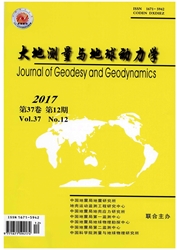

 中文摘要:
中文摘要:
Several days before the Ms7.0 Lushan earthquake,the YRY-4 borehole Strainmeter at Guza Station recorded prominent abnormal changes.The strain anomalies are very striking on the smooth background of several years’recording after the Wenchuan earthquake.However,because construction in the town of Guza has been undergoing rapid development in recent years,many factors have interfered with observations at the station.Whether or not the observed strain changes before the Lushan earthquake were affected by any of the sources of interference becomes a question that must be answered.Among the likely sources of interference,apartment construction,sportsground reconstruction,and tunnel cutting can be excluded by analyzing the morphological characteristic of the anomalies.The two remaining most possible sources are road construction in front of the station and the water level change of the nearby Dadu River caused by water filling into and discharging from an upstream reservoir.Through field investigation,comparison of the correlation between the strain and the seismographic recordings,comparison of the correlation between the strain and the Dadu River flow recordings,and analysis of the strain anomaly characteristics,we conclude that the abnormal changes observed at Guza Station cannot be attributed to either of these two sources but should be related to the Lushan earthquake.
 英文摘要:
英文摘要:
Several days before the MsT. 0 Lushan earthquake, the YRY-4 borehole Strainmeter at Guza Station recorded prominent abnormal changes. The strain anomalies are very striking on the smooth background of several years' recording after the Wenchuan earthquake. However, because construction in the town of Guza has been undergoing rapid development in recent years, many factors have interfered with observations at the station. Whether or not the observed strain changes before the Lushan earthquake were affected by any of the sources of interference becomes a question that must be answered. Among the likely sources of interference, apartment construction, sportsground reconstruction, and tunnel cutting can be excluded by analyzing the morphological characteristic of the anomalies. The two remaining most possible sources are road construction in front of the station and the water level change of the nearby Dadu River caused by water filling into and discharging from an upstream reservoir. Through field investigation, comparison of the correlation between the strain and the seismographic recordings, comparison of the correlation between the strain and the Dadu River flow recordings, and analysis of the strain anomaly characteristics, we conclude that the abnormal changes observed at Guza Station cannot be attributed to either of these two sources but should be related to the Lushan earthquake.
 同期刊论文项目
同期刊论文项目
 同项目期刊论文
同项目期刊论文
 期刊信息
期刊信息
